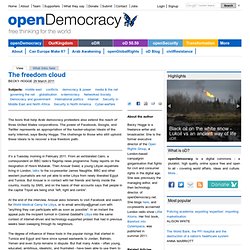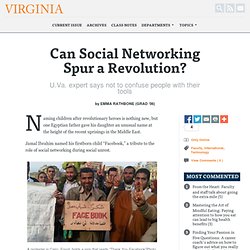

Le Parquet enquête sur la publication anticipée des estimations. The freedom cloud. It’s a Tuesday morning in February 2011.

From an exhilarated Cairo, a correspondent on BBC radio’s flagship news programme Today reports on the resignation of Hosni Mubarak. Then Anouar Swed, a young Libyan expatriate living in London, talks to the co-presenter James Naughtie. Can Social Networking Spur a Revolution? Naming children after revolutionary heroes is nothing new, but one Egyptian father gave his daughter an unusual name at the height of the recent uprisings in the Middle East.

Jamal Ibrahim named his firstborn child “Facebook,” a tribute to the role of social networking during social unrest. A protester in Cairo, Egypt, holds a sign that reads “Thank You Facebook”Photo by Richard Engel, NBC News While Facebook, Twitter and other sites proved invaluable in keeping Egyptians connected during the revolt, one U.Va. expert says it’s important not to confuse the tools with the people who use them. Twitter Exec Proposes Theory of Influence of Social Media on Revolutions. Now here’s a topic we can all agree on: The role of social media in political revolutions. Kidding. While some like Malcolm Gladwell and Evgeny Morozov belittle the hubris of crediting Facebook and Twitter for such a contribution, revolutionaries like Wael Ghonim and armchair commentators like the greater Twitter userbase love to gab about social media’s role in community organizing and couriering authentic messages to the world.